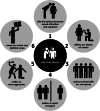Infection threat shapes our social instincts
- PMID: 33583997
- PMCID: PMC7873116
- DOI: 10.1007/s00265-021-02975-9
Infection threat shapes our social instincts
Abstract
We social animals must balance the need to avoid infections with the need to interact with conspecifics. To that end we have evolved, alongside our physiological immune system, a suite of behaviors devised to deal with potentially contagious individuals. Focusing mostly on humans, the current review describes the design and biological innards of this behavioral immune system, laying out how infection threat shapes sociality and sociality shapes infection threat. The paper shows how the danger of contagion is detected and posted to the brain; how it affects individuals' mate choice and sex life; why it strengthens ties within groups but severs those between them, leading to hostility toward anyone who looks, smells, or behaves unusually; and how it permeates the foundation of our moral and political views. This system was already in place when agriculture and animal domestication set off a massive increase in our population density, personal connections, and interaction with other species, amplifying enormously the spread of disease. Alas, pandemics such as COVID-19 not only are a disaster for public health, but, by rousing millions of behavioral immune systems, could prove a threat to harmonious cohabitation too.
Keywords: Behavioral immune system; Disgust; Infectious disease; Ingroup/outgroup; Oxytocin; Public health.
© The Author(s) 2021.
Conflict of interest statement
Conflict of interestThe authors declare that they have no conflict of interest.
Figures

Similar articles
-
Conspecific infection threat rapidly biases the social responses of female mice: Involvement of oxytocin.Horm Behav. 2019 Jul;113:67-75. doi: 10.1016/j.yhbeh.2019.04.016. Epub 2019 May 10. Horm Behav. 2019. PMID: 31047886
-
Social neuroscience of disgust.Genes Brain Behav. 2019 Jan;18(1):e12508. doi: 10.1111/gbb.12508. Epub 2018 Aug 24. Genes Brain Behav. 2019. PMID: 30062689 Review.
-
The need for holistic, longitudinal and comparable, real-time assessment of the emotional, behavioral and societal impact of the COVID-19 pandemic across nations.Psychiatriki. 2021 Apr 19;32(1):15-18. doi: 10.22365/jpsych.2021.010. Epub 2021 Mar 8. Psychiatriki. 2021. PMID: 33759804 English, Greek, Modern.
-
Social dilemmas of sociality due to beneficial and costly contagion.PLoS Comput Biol. 2022 Nov 21;18(11):e1010670. doi: 10.1371/journal.pcbi.1010670. eCollection 2022 Nov. PLoS Comput Biol. 2022. PMID: 36409767 Free PMC article.
-
[The Gulf War Syndrome twenty years on].Encephale. 2013 Oct;39(5):332-8. doi: 10.1016/j.encep.2012.11.003. Epub 2013 Jan 23. Encephale. 2013. PMID: 23351934 Review. French.
Cited by
-
An analysis of awe evoked by COVID-19 on green purchasing behavior: A dual-path effect of approach-avoidance motivation.Front Psychol. 2022 Aug 11;13:952485. doi: 10.3389/fpsyg.2022.952485. eCollection 2022. Front Psychol. 2022. PMID: 36033010 Free PMC article.
-
Mitochondria-Microbiota Interaction in Neurodegeneration.Front Aging Neurosci. 2021 Dec 23;13:776936. doi: 10.3389/fnagi.2021.776936. eCollection 2021. Front Aging Neurosci. 2021. PMID: 35002678 Free PMC article. Review.
-
Potential of Endogenous Oxytocin in Endocrine Treatment and Prevention of COVID-19.Front Endocrinol (Lausanne). 2022 May 3;13:799521. doi: 10.3389/fendo.2022.799521. eCollection 2022. Front Endocrinol (Lausanne). 2022. PMID: 35592777 Free PMC article. Review.
-
First impressions of a new face are shaped by infection concerns.Evol Med Public Health. 2023 Aug 7;11(1):309-315. doi: 10.1093/emph/eoad025. eCollection 2023. Evol Med Public Health. 2023. PMID: 37706031 Free PMC article.
-
Political Attitudes and Disease Threat: Regional Pathogen Stress Is Associated With Conservative Ideology Only for Older Individuals.Pers Soc Psychol Bull. 2024 Nov;50(11):1581-1595. doi: 10.1177/01461672231183199. Epub 2023 Jul 10. Pers Soc Psychol Bull. 2024. PMID: 37424438 Free PMC article.
References
-
- Aarøe L, Petersen MB, Arceneaux K. The behavioral immune system shapes political intuitions: why and how individual differences in disgust sensitivity underlie opposition to immigration. Am Polit Sci Rev. 2017;111:277–294. doi: 10.1017/S0003055416000770. - DOI
Publication types
LinkOut - more resources
Full Text Sources
Other Literature Sources
